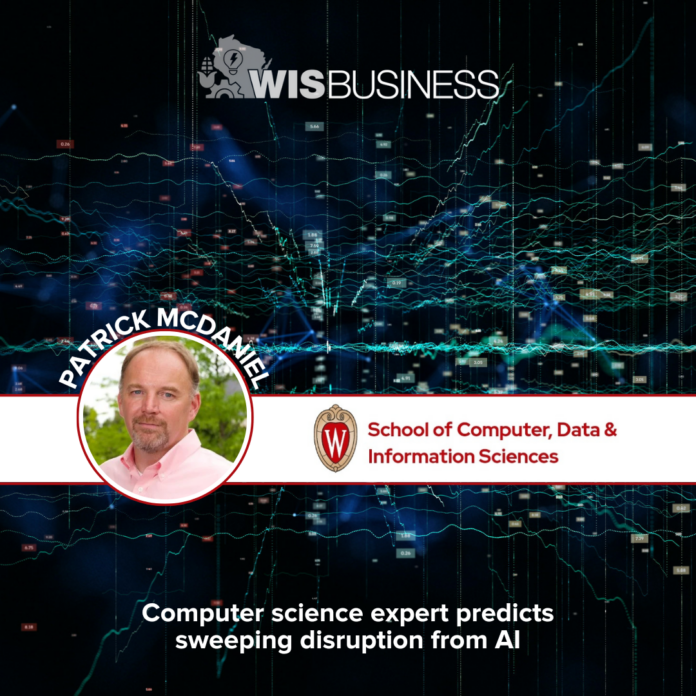A computer science expert with UW-Madison predicts AI advancement will lead to massive disruptions in the “social fabric” of the country and world, in much the same way as the industrial revolution did more than 200 years ago.
Prof. Patrick McDaniel, the Tsun-Ming Shih Professor of Computer Sciences in the university’s School of Computer, Data and Information Sciences, shared his outlook on the fast-growing technology during a recent Wisconsin Alumni Foundation webinar.
His experience in this area includes working on a national strategy document around AI for the White House in 2017, when the potential for the technology was becoming more clear.
“What we’re seeing is the beginning of what we call social disruption … What we’re going to see is a change in the very nature of work,” he said last week.
Just as the transition from a largely agricultural society to an industrial society led to a huge boost in productivity starting in the late 1700s, McDaniel says market forces resulting from AI being much cheaper than human labor will do the same across many industries. These include health care, finance, insurance, marketing, education, e-commerce, manufacturing and transportation.
“I wouldn’t look at this as simply a loss, but this is a recalculation, a recalibration of our society. And perhaps leading to a renaissance,” McDaniel said. “What if we could spend much more of our time, the vast majority of our time, in more creative, more inventive, more innovative endeavors?”
He said AI being applied to labor-intensive industries like trucking will help drive this trend, along with national policies aimed at helping the economy handle the rapid changes he foresees.
But at the same time, AI is also being applied in the creative realm, as generative software can produce text, pictures and even videos that are increasingly difficult to distinguish from what’s real.
“This will change the nature of creation, and it will create new opportunities for immense innovation in things like entertainment,” he said. “But it has some downsides, because we have to worry about things like propaganda.”
And though he conceded that outsourcing certain tasks to smart software will lead to a loss of human expertise gained through experience, McDaniel noted AI will always need to be fed new information and maintained by people.
He argues the technology “can be extraordinarily fragile” and vulnerable in certain situations, and is far from infallible. For example, AI will often reproduce the biases inherent to human decision making when trained on datasets that are heavily influenced by people, he said.
“Just handing it over to AI is kind of a popular cliche, but that’s not actually the way AI is going to play out in practice,” he said. “What’s going to happen is … we’re going to get better at watching the AI evolve, and as we do that, we’re going to become much better at thinking about expertise in a broader context.”
Still, he expects workers “in the lowest skill levels” of the economy will be affected the most by AI-enabled automation.
“Amazon can spend what they paid one employee a year for to buy a robot that never sleeps, never strikes and lives for some 10 years … so the economics are overwhelming, and so what we’ll see is that massive displacement,” he said.
Watch the full discussion here.






